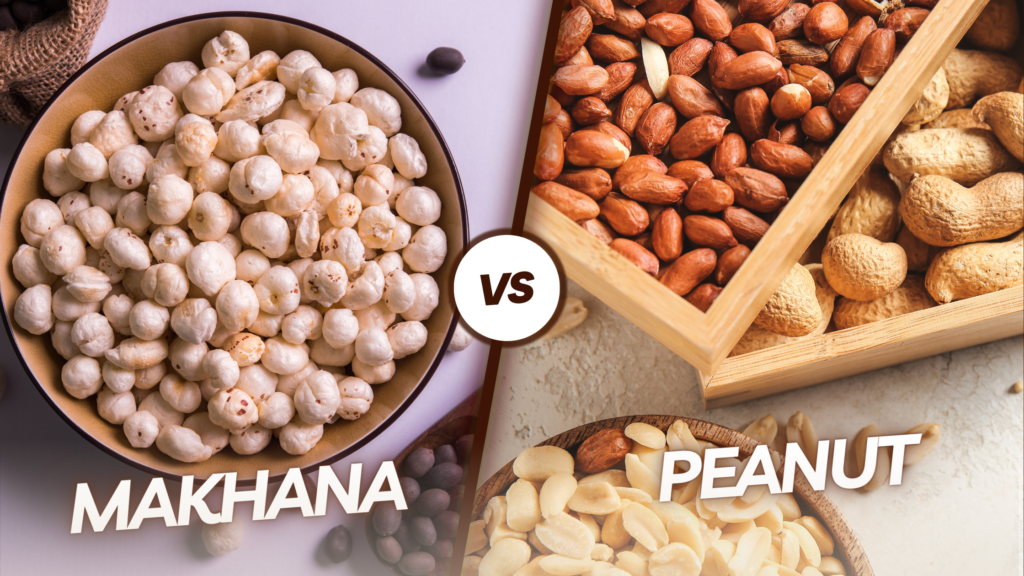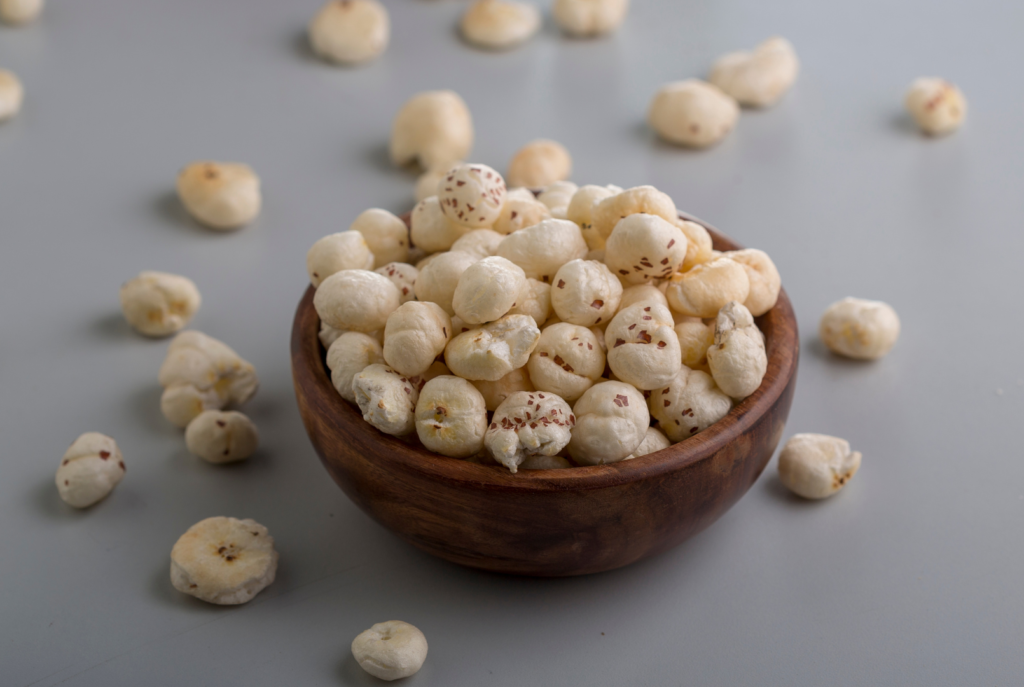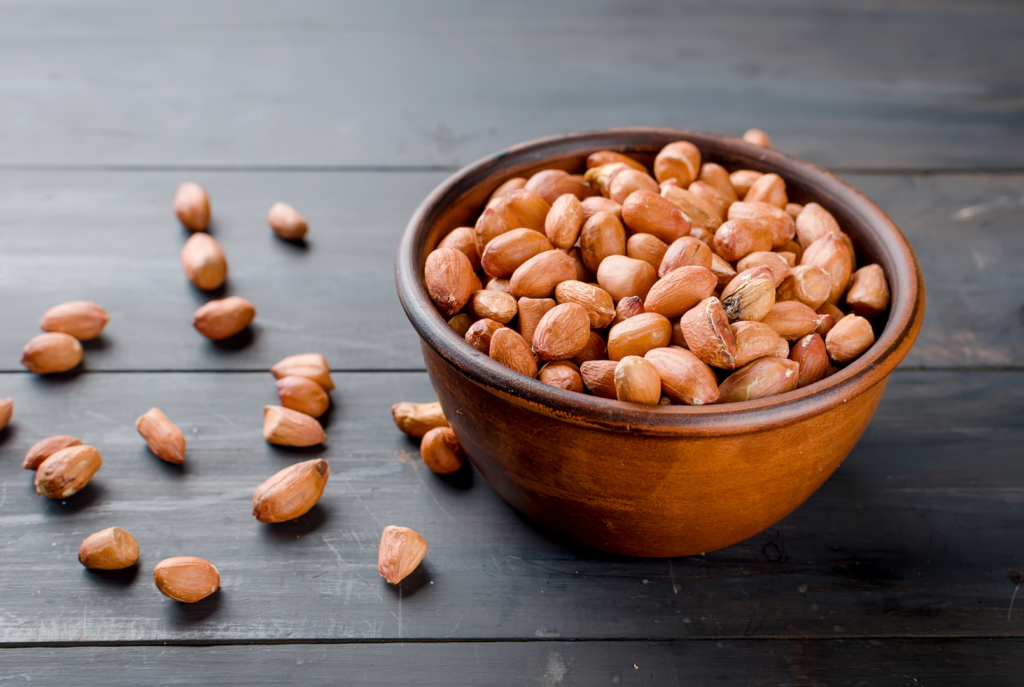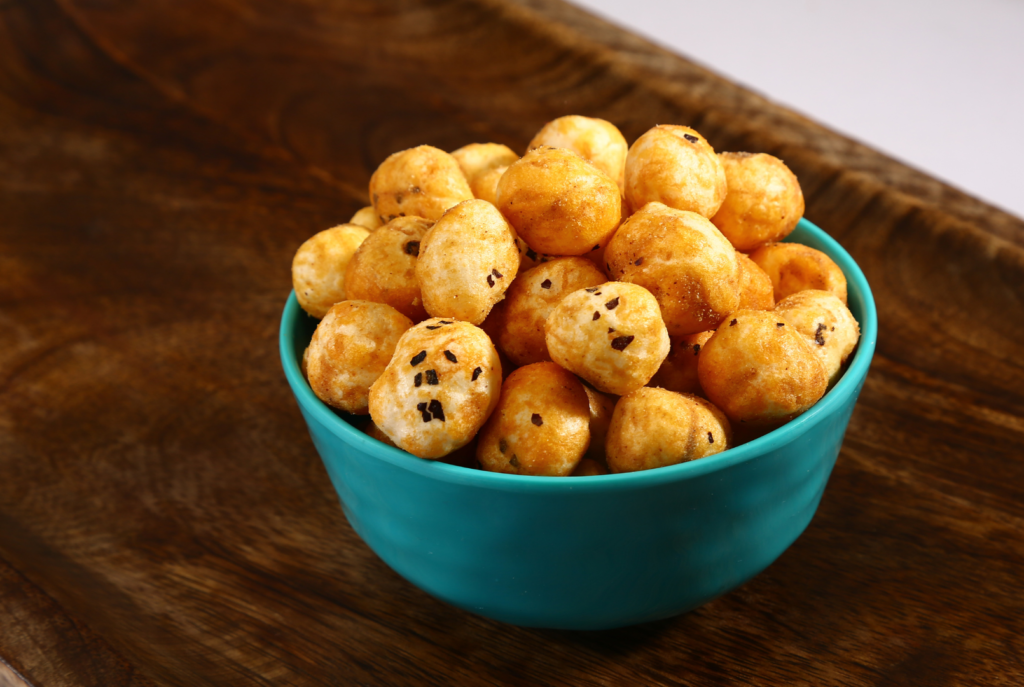
Table of Contents

When it comes to snacking, many of us are on the lookout for options that not only satisfy our cravings but also align with our health and weight-loss goals. Two popular snacks that often come up in this conversation are makhana (fox nuts) and peanuts. Both offer unique flavors and nutritional benefits, but how do they compare in the context of weight loss? In this blog, we will explore makhana vs peanuts, analyzing their nutritional profiles and helping you decide which is the healthier choice for your weight-loss journey.
Curious about how snacks affect your metabolism and energy?
Read: 10 Indian Breakfasts to Kickstart Your Metabolism and Boost Your Energy for more healthy eating tips.
Makhana vs Peanuts:
1. Nutritional Overview
Makhana
Makhana, also known as fox nuts, are the seeds of the lotus flower. They are low in calories and high in nutrients, making them a popular choice for health-conscious individuals. Here’s a quick look at the nutritional profile of 100 grams of makhana:
- Calories: Approximately 350
- Protein: 9 grams
- Fat: 1 gram
- Carbohydrates: 74 grams
- Fiber: 7 grams
- Vitamins and Minerals: Rich in magnesium, potassium, and phosphorus.
Makhana is also gluten-free, making it a suitable snack for those with gluten intolerance or celiac disease.

Peanuts
Peanuts, technically legumes, are also a favorite snack for many due to their crunchiness and rich flavor. However, they are higher in calories and fat compared to makhana. Here’s the nutritional breakdown for 100 grams of peanuts:
- Calories: Approximately 570
- Protein: 25 grams
- Fat: 49 grams
- Carbohydrates: 16 grams
- Fiber: 9 grams
- Vitamins and Minerals: Excellent source of vitamin E, niacin, and magnesium.
Peanuts contain healthy fats, but their calorie-dense nature can make it easy to overconsume.

2. Caloric Density
When aiming for weight loss, understanding caloric density is crucial. Caloric density is the measure of how many calories are present in a given weight of food. Foods with low caloric density provide fewer calories per gram, allowing you to eat larger portions without exceeding your caloric intake.
- Makhana has a lower caloric density, which means you can enjoy a generous serving without consuming too many calories. This can help you feel fuller while still adhering to your weight-loss goals.
- Peanuts, while nutritious, are calorie-dense due to their high-fat content. A small handful can easily lead to a significant calorie intake, which may not be suitable for weight-loss diets. The temptation to munch on peanuts can often lead to excess caloric consumption without realizing it.
3. Protein and Fiber Content
Both makhana and peanuts contain protein and fiber, essential nutrients for weight loss:
- Makhana provides a decent amount of protein and is high in fiber, promoting satiety and aiding digestion. Fiber contributes to prolonged feelings of fullness, which can decrease the likelihood of overeating. Makhana’s light texture and crunch make it an enjoyable snack that can satisfy your cravings without the extra calories.
- Peanuts are higher in protein, making them a good option for muscle maintenance and repair. However, their high fat content may not be ideal for everyone, especially those looking to lose weight. Additionally, peanuts often come in various flavored forms, which may contain added sugars and salts that can detract from their health benefits.
4. Glycemic Index
The glycemic index (GI) assesses how rapidly foods elevate blood sugar levels. Foods with a low GI are preferable for weight loss as they provide sustained energy and help control hunger.
- Makhana has a low glycemic index, making it an excellent choice for individuals looking to maintain stable blood sugar levels. This characteristic is beneficial for weight management, especially for those with insulin sensitivity.
- Peanuts also have a low GI, but their higher caloric content can lead to increased calorie consumption, potentially hindering weight loss efforts. While peanuts may provide energy, they may not be as effective in curbing hunger due to their dense caloric profile.
5. Antioxidant Properties
Antioxidants are compounds that help combat oxidative stress and inflammation in the body, which can contribute to weight gain and other health issues.
- Makhana is rich in antioxidants, particularly flavonoids, which can enhance overall health and support weight-loss efforts by reducing inflammation. These antioxidants contribute to overall wellness and may help protect against chronic diseases.
- Peanuts also contain antioxidants, including resveratrol, which has been associated with various health benefits. However, the overall health benefits may be overshadowed by their higher fat and calorie content. Balancing your intake of peanuts is essential to reap their benefits without overindulging.
6. Satiety and Portion Control
Satiety is the sensation of fullness that occurs after consuming food. Foods that provide high satiety can help control overall calorie intake, making them more effective for weight loss.
- Makhana tends to be more filling due to its fiber content and lower caloric density. Snacking on makhana can prevent hunger pangs, helping you to resist unhealthy snack choices throughout the day. Its light and crispy texture makes it a satisfying alternative to chips and other processed snacks.
- Peanuts, while they can provide a sense of fullness, are easy to overconsume due to their palatable nature. A small serving may not satisfy hunger, leading to the temptation to eat more than intended. This can be particularly problematic for individuals looking to lose weight, as it may lead to an excess caloric intake.
7. Versatility in Cooking
Both makhana and peanuts can be enjoyed in various ways, making them versatile additions to your diet.
- Makhana can be enjoyed roasted, spiced, or incorporated into sweet and savory dishes. It can be used as a topping for salads, blended into smoothies, or ground into flour for healthy recipes. This versatility allows you to experiment with flavors and textures while adhering to your health goals.
- Peanuts can be consumed raw, roasted, or made into peanut butter, adding creaminess and flavor to various dishes. However, it’s essential to be mindful of portion sizes, especially with peanut butter, as it can be easy to exceed recommended serving sizes.

Conclusion: Which is the Healthier Snack for Weight Loss?
Both makhana and peanuts have their unique nutritional benefits, but when it comes to weight loss, makhana edges out as the healthier choice. With lower calories, a favorable nutrient profile, and higher fiber content, makhana can help you satisfy your snack cravings without derailing your weight-loss efforts.
Dt. Anup Agharwal recommends incorporating makhana into your diet, especially if you are aiming for weight loss. He states, “Makhana is a fantastic snack option for those looking to shed pounds. It’s low in calories and high in nutrients, making it an ideal choice for health-conscious individuals.”
So, the next time you’re reaching for a snack, consider choosing makhana for a delicious and nutritious option that aligns with your weight-loss goals!

FAQs
1. What are makhana and peanuts?
Ans. Makhana, also known as fox nuts, are seeds from the lotus flower, while peanuts are technically legumes. Both are popular snacks with different nutritional profiles.
2. Which snack is better for weight loss: makhana or peanuts?
Ans. Makhana is generally considered the healthier option for weight loss due to its lower calorie content, higher fiber, and lower fat compared to peanuts.
3. How many calories are in 100 grams of makhana?
Ans. There are approximately 350 calories in 100 grams of makhana.
4. How many calories are in 100 grams of peanuts?
Ans. 100 grams of peanuts contain about 570 calories.
5. Is makhana gluten-free?
Ans. Yes, makhana is gluten-free, making it suitable for individuals with gluten intolerance or celiac disease.
6. Can I eat makhana and peanuts as part of a healthy diet?
Ans. Yes, both can be included in a balanced diet, but portion control is essential, especially with peanuts due to their higher calorie density.
7. Which snack provides more protein?
Ans. Peanuts provide more protein than makhana, with approximately 25 grams per 100 grams, compared to 9 grams in makhana.
8. What are the health benefits of makhana?
Ans. Makhana is rich in antioxidants, high in fiber, low in calories, and contains essential vitamins and minerals, promoting overall health and aiding in weight management.
9. How can I incorporate makhana into my diet?
Ans. You can enjoy makhana roasted, spiced, in salads, blended into smoothies, or ground into flour for various recipes.
10. Do peanuts have any health benefits?
Ans. Yes, peanuts are a good source of healthy fats, protein, and essential vitamins and minerals, but their calorie-dense nature requires moderation.

🎯 10+ years of Experience
🎓 10k+ Trained ( 📍 Jaipur )
💪 Helping change people’s lives
🌿 Most trusted lifestyle counselor